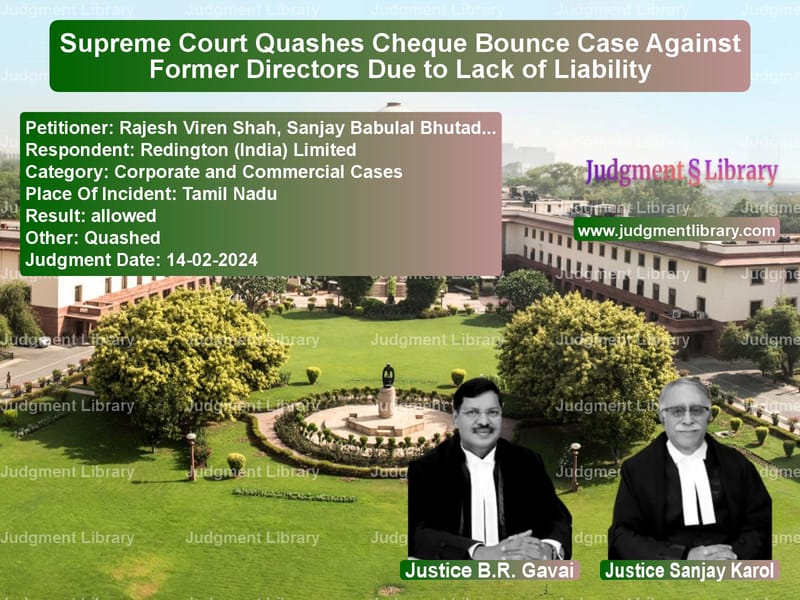Supreme Court Quashes Cheque Bounce Case Against Former Directors Due to Lack of Liability
The Supreme Court of India has ruled in favor of two former directors, Rajesh Viren Shah and Sanjay Babulal Bhutada, quashing criminal proceedings against them under Section 138 of the Negotiable Instruments Act, 1881 (NI Act). The judgment clarifies that directors who have formally resigned before the issuance of a dishonored cheque cannot be held liable under the NI Act. This ruling reinforces the principle that liability for a company’s financial obligations must be determined based on active involvement at the time of the alleged offense.
Background of the Case
The case involved a dispute between Redington (India) Limited and M/s MIEL e-Security Private Limited over three dishonored cheques issued by MIEL e-Security Private Limited. The cheques, amounting to Rs. 7,10,085, Rs. 1,85,09,054, and Rs. 10,00,000, were issued on March 22, 2014, but were dishonored due to insufficient funds. Redington filed a complaint under Section 138 of the NI Act against the company and its directors.
However, the two appellants, Rajesh Viren Shah and Sanjay Babulal Bhutada, had resigned as directors of MIEL e-Security Private Limited on December 9, 2013, and March 12, 2014, respectively, before the issuance of the cheques. Their resignations were duly recorded in Form 32 as per the Companies Act, 1956.
Arguments by the Appellants
- They had resigned before the cheques were issued, and their resignations were legally recorded and accepted.
- They had no role in issuing the cheques, as they were not in charge of the company’s financial operations at the time.
- The prosecution failed to provide evidence that they were responsible for the company’s financial affairs when the cheques were dishonored.
- The complainant did not dispute the authenticity of Form 32, which confirmed their resignation dates.
Arguments by the Respondent
- As former directors, they should still be held liable for the company’s financial transactions.
- The cheques were issued in relation to business transactions that occurred while they were still in office.
- Their resignations did not absolve them of responsibility, as financial liabilities often extend beyond directorship tenure.
Supreme Court’s Observations
1. Liability of Directors Under Section 141 of the NI Act
The Court referred to Section 141 of the NI Act, which states that only those in charge of the company’s business at the time of the offense can be held liable. The judgment clarified:
“Every person who at the time of the offense was responsible for the affairs/conduct of the business of the company shall be held liable… However, if such an act was done without his knowledge or after him having taken all necessary precautions, he would not be held liable.”
2. Importance of Form 32 in Establishing Resignation
The Court noted that Form 32 is a legally recognized document under the Companies Act. Since the complainant did not challenge its authenticity, the appellants’ resignations were accepted as valid.
3. Judicial Precedents on Director Liability
The Court cited Monaben Ketanbhai Shah v. State of Gujarat and S.M.S. Pharmaceuticals Ltd. v. Neeta Bhalla, emphasizing that a director cannot be held vicariously liable unless a complaint clearly establishes their role in the offense.
4. Lack of Direct Involvement in Cheque Issuance
The Court found no evidence that the appellants participated in issuing the cheques or had control over the company’s financial operations at the relevant time.
Final Judgment
- The Supreme Court quashed the criminal proceedings against the appellants under Section 138 of the NI Act.
- It ruled that liability under the NI Act cannot be imposed on former directors who were not in charge of the company at the time of cheque issuance.
- All criminal proceedings against the appellants were dismissed.
Legal and Corporate Implications
1. Protection for Resigned Directors
The ruling safeguards former directors from being unfairly held liable for transactions occurring after their resignation.
2. Strengthening Due Diligence in Business Transactions
Companies must ensure that only active directors are involved in financial transactions to avoid legal complications.
3. Clarification on the Role of Form 32
This judgment reinforces the legal validity of Form 32 in establishing resignation dates and absolving directors from subsequent liabilities.
4. Fair Application of Section 138 of the NI Act
The decision ensures that Section 138 is applied only to those directly responsible for the issuance of dishonored cheques.
Conclusion
The Supreme Court’s judgment in this case provides clarity on the liability of directors under the NI Act. By ruling that former directors cannot be held accountable for financial transactions conducted after their resignation, the Court has reinforced the principle that criminal liability must be based on direct involvement. This landmark decision will serve as an important precedent in similar cases involving corporate liabilities and director responsibilities.
Petitioner Name: Rajesh Viren Shah, Sanjay Babulal Bhutada.Respondent Name: Redington (India) Limited.Judgment By: Justice B.R. Gavai, Justice Sanjay Karol.Place Of Incident: Tamil Nadu.Judgment Date: 14-02-2024.
Don’t miss out on the full details! Download the complete judgment in PDF format below and gain valuable insights instantly!
Download Judgment: rajesh-viren-shah,-s-vs-redington-(india)-li-supreme-court-of-india-judgment-dated-14-02-2024.pdf
Directly Download Judgment: Directly download this Judgment
See all petitions in Company Law
See all petitions in Corporate Compliance
See all petitions in unfair trade practices
See all petitions in Judgment by B R Gavai
See all petitions in Judgment by Sanjay Karol
See all petitions in allowed
See all petitions in Quashed
See all petitions in supreme court of India judgments February 2024
See all petitions in 2024 judgments
See all posts in Corporate and Commercial Cases Category
See all allowed petitions in Corporate and Commercial Cases Category
See all Dismissed petitions in Corporate and Commercial Cases Category
See all partially allowed petitions in Corporate and Commercial Cases Category







